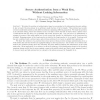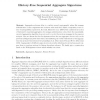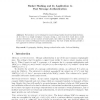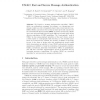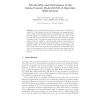118
click to vote
IACR
2011
14 years 1 months ago
2011
We study the problem of authentication based on a weak key in the information-theoretic setting. A key is weak if its min-entropy is an arbitrary small fraction of its bit length. ...
135
Voted
IACR
2011
14 years 1 months ago
2011
Aggregation schemes allow to combine several cryptographic values like message authentication codes or signatures into a shorter value such that, despite compression, some notion o...
183
click to vote
CTRSA
2011
Springer
14 years 5 months ago
2011
Springer
Abstract. Many real-world protocols, such as SSL/TLS, SSH, IPsec, IEEE 802.11i, DNSSEC, and Kerberos, derive new keys from other keys. To be able to analyze such protocols in a com...
152
click to vote
CRYPTO
1995
Springer
15 years 5 months ago
1995
Springer
We introduce a new technique for constructing a family of universal hash functions. At its center is a simple metaphor: to hash a string x, cast each of its words into a small numb...
137
click to vote
FSE
1997
Springer
15 years 5 months ago
1997
Springer
Abstract. Message authentication codes (MACs) using polynomial evaluation have the advantage of requiring a very short key even for very large messages. We describe a low complexit...
109
Voted
CRYPTO
2006
Springer
15 years 5 months ago
2006
Springer
We address the message authentication problem in two seemingly different communication models. In the first model, the sender and receiver are connected by an insecure channel and...
140
click to vote
ASIACRYPT
2007
Springer
15 years 6 months ago
2007
Springer
In an effort to design a MAC scheme that is built using block cipher components and runs faster than the modes of operation for message authentication, Daemen and Rijmen have propo...
183
click to vote
CRYPTO
1999
Springer
15 years 6 months ago
1999
Springer
We describe a message authentication algorithm, UMAC, which can authenticate messages (in software, on contemporary machines) roughly an order of magnitude faster than current prac...
117
click to vote
CRYPTO
2000
Springer
15 years 6 months ago
2000
Springer
In order to avoid birthday attacks on message authentication schemes, it has been suggested that one add randomness to the scheme. One must be careful about how randomness is added...
122
click to vote
INDOCRYPT
2004
Springer
15 years 7 months ago
2004
Springer
Abstract. The recently introduced Galois/Counter Mode (GCM) of operation for block ciphers provides both encryption and message authentication, using universal hashing based on mul...
